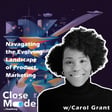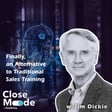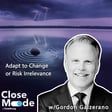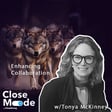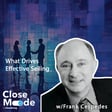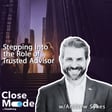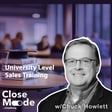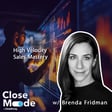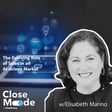Introduction: Welcome and Guest Introduction
00:00:03
Speaker
Hello, and welcome to another edition of Close Mode, the Enterprise sales show. I'm Brian Deetmeyer, CEO of Close Strong. And today I'm super lucky to be, especially just before a long holiday weekend with ah Lisa Hammack, who's director of global sales enablement with SysSense. And for for those of you who aren't familiar with the company, it's pretty cool. They accelerate product innovation by leveraging AI and machine learning. It's a global platform that drives better and faster decisions. So, Lisa, welcome to the show. Thank you. Happy to be here.
00:00:37
Speaker
And um so i I was auditioning for your your voiceover guy for your company. So I hope I passed the audition. to You did. You did a great job. Thank so you. So you and I were chatting a week ago.
What is Hypothesis Selling?
00:00:50
Speaker
and And just sort of like in passing, you mentioned this hypothesis selling thing. And it and you know my ears perked up. And I was like, oh, this is cool. Let's talk about it. So how would you define hypothesis selling? Oh, that's a great question. Well, if we, let's see, if we go back to elementary school when in our science classes, if you remember a hypothesis ah definition was an educated guess. Okay. No, that's not exactly what it is when it comes to hypothesis selling. But so the way I define it is it's actually taking the time to do a lot of research to understand your buyer, ah both the person you're selling to and the company you're selling to.
00:01:32
Speaker
um a lot about the industry and coming into that first call with them with a perspective on what you think their problems are. And so basically not waiting to just ask them a zillion questions because they they probably already have fatigue from going through that with other vendors, but coming with an opinion of what you think you know their problems are, are that things that you can help them solve.
Differences Between Selling Approaches
00:01:55
Speaker
Yeah. And the the thing that I like about that is I've often said that there's there's sort of a finite list of stuff That that our solutions can impact, right? So it's for a different stakeholder. So i I do think you can draw a hypothesis about that. um and And I do think it's helpful. How would you um sort of came into my mind as you and I were talking about it? Like, is there a difference in hypothesis selling from like solution selling or value selling? How do you think about that?
00:02:25
Speaker
Yeah, no. Um, I think there definitely is. It's, so it's funny cause, um, having done this a long time, yeah not to age myself, but you know, so there's, you look at the different sales methodology. gee So you hear insight selling, you know, is one to insight selling is more about kind of educating them on like what you've seen about the market, what's going on. So bringing in that all of these are about being a trusted advisor and a consultative and really caring about the buyer's journey versus caring about like, well, how my, what my product's going to do. Right. And so if you look at value selling, You know, value selling to me is more about coming in and learning what their problems are. okay and And then and figuring out how how our solution can best help them solve those problems. And then on the other end, there's the ROI piece. What is their, you know, looking at what is the return on investment going to be um by using our solution to solve those problems?
Impact of Hypothesis Selling on Sales Cycles
00:03:18
Speaker
yeah So that's why so I think the difference I think that hypothesis kind of going into the beginning of the sales process and really having an opinion and hopefully maybe teaching them something new or getting them to think about things differently. um and And what that does is I think it has If you do it correctly, you know, it can shorten your so your your sales cycle. It can also, you know, hopefully get them to prioritize, um you know, answering this, problem getting this problem solved, where a lot of times, you know, you you're in there, you're competing against different projects. So it's getting to hopefully shorten that cycle and getting to think like, yes, this is a problem that we need to solve.
00:03:57
Speaker
Yeah, it's you make me think it's like there's guiding the customer versus open-ended, you know, this, you know, what what keeps you awake at night. So if if I'm asking you that, Lisa, you're just yeah you're giving me back what you already know. It has no value to you. Maybe it might one day when I connect to it, but yeah we we we should know this, which is what which is what
Why Buyers Prefer Insightful Sellers
00:04:17
Speaker
I'm hearing. and um ah Jim dickey the sales mastery put out a buyer study puts it out every year and this is a really sad. ah Stat that came out of it that buyer say sellers are the ninth place they go out of ten places for insight but that the the only. Ray of hope or a big ray of hope in there with that they said oh ah but i will talk to them.
00:04:38
Speaker
yeah think But they got to be bringing me something. And and so this this is kind of what what I'm hearing you talk about. So it it also occurs to me that in in order to do this right, um it might be ah sales leaders, sales enablement or marketing. like they We've got to support reps in this hypothesis selling and environment, right? Because they're not ready to go there. what yeah What kind of support do they need or do you give your team to be able to execute this?
Collaboration and Training for Hypothesis Selling
00:05:07
Speaker
Yeah, no, that's a great question. I think it's it's it's absolutely collaborative effort by really all parts of the business. And so when I look at my role in enablement, it's obviously um one, giving them the skills that are needed. So
00:05:23
Speaker
things like you know listening skills, um time management, believe it or not, taking the time, you know putting it on your calendar to do this research, to really understand the market, to understand your business, um to be more of an expert. ah you know Definitely, I'm a big advocate of you know ah Teaching trying and then doing so you know giving them scenarios where we're doing you know practicing research and coming up with our hypo hypothesis to see like how close are we. um You know both in customers that we've already you know sold to is a great example so and with that you know if you look at at revenue ops.
00:06:01
Speaker
having them, working with them to really analyze who we've sold to, what are our customers, our current customers doing, and really using some of that analysis to help us drive some of our opinions. And then, of course, marketing, you know, so, you know, customer stories, case studies, all the things that, you know, will help us support um as we're going through the selling mechanism focused on the buyer. So I really think it's a collaborative effort and it really takes on everybody, you know, working together to to to arm our salespeople with the right information.
The Human Side of Selling: Confidence and Risk
00:06:33
Speaker
Yeah. And here it's it's funny because you're kind of hitting on something that that I believe is like unbelievably important and in today's selling environment that buyers are very, I read a buyer seller insights blog that says there is bad buying just as there is bad selling. And and it was one of the first time that like we we all beat ourselves up for like, oh, there were salesperson, but
00:06:54
Speaker
that yeah it's buyers are guilty of suboptimal decisions and and that's what comes to mind as you're talking through this that we're actually yeah there's such a huge ah benefit i want to talk about that the human aspect of this in our previous call you talked about like. Some sellers fear ah having having an opinion you know and and i love. leaning into more lately on the podcast like the the human side of this how how do we deal with that fear to get them confident enough to to because this this is gutsy as you say this is consulting and i was consultant is something but this is kind of almost real consulting.
00:07:30
Speaker
Yeah, no, I think that's that's a great question, too. And I think um some of it is like, like I said, or arming them with ah with information they can feel confident in. And then um sometimes they just have to go do it. And what they'll find out, at least the sellers that I've worked with is, it's okay to be wrong. say and And what you find out, if the buyer comes back and says, you know, that's actually not correct, they'll typically go on and they'll tell you what is the product, how they see it. And so based on that, you're opening yourself up to have a much deeper conversation to do that second and and third level discovery and really understand their business from their perspective.
00:08:08
Speaker
So some, actually sometimes you learn more by being wrong because then they're willing to say, no, you're wrong. This is what it is. So I think just being, you know, being brave, trying it a few times and seeing where that conversation takes you, um, is, is such a benefit that, that people just, the more you do it, the better you're going to be.
Categories and Stories in Hypothesis Selling
00:08:26
Speaker
Yeah. I'm, I'm trying to think of categories and I'm thinking back to my, my own business as well, like categories of, of. things you can hypothesize about. um and and I feel like there's like one about, hey, customer, like there's a missed opportunity. like if you're If you're not leveraging this technology or there's there's avoiding a bad thing, like I think about we're working with a technology company that manages risk and it's like, if you don't do this, like these four bad things could happen. now yeah ah what what would you What comes to mind about sort of the category of hypothesis that we're bringing?
00:08:59
Speaker
Yeah, so all'll yeah I'll use an example in our business. So we sell emb be embedded analytics. And so companies will come to us and they'll say, Oh, you know, we're starting to see some churn. We have um some of our customers saying we we were just not giving, you know, because companies are very data driven today, right? And they're not getting the right analytics um through the, because a lot of these are software companies that are selling solutions to their customers. um But what we're able to say, okay, but Also, you know with the analytics, um are you have you thought about monetizing that? Because they're saying you know they're they're they're finding different they're also not growing, so you're like, okay, well, have you thought about different revenue streams? Monetizing, maybe having a preming premium offering.
00:09:44
Speaker
um And like we can learn like based on like what we've seen with other companies similar to theirs.
Practicing Hypothesis Selling Through Training
00:09:50
Speaker
Are they doing that? You know what I mean? So that's something yeah we know are we can and we can use that storytelling of like, well, Dan over here at XYZ company, you know, they're telling us this and you know, use it use the storytelling user, you know, our current customers to figure out like, you know, they probably haven't even thought about this and uses it opens up another channel for why they need to buy. Yeah, it's two reactions to that. One, that that's what buyers said they want in the in this buyer study. And the other the other reaction is, it's kind of a cool job. like ah As I'm hearing, like that's that's a role as a seller. That's different than selling stuff. That's like problem solving. And again, and again yeah almost pure consulting in a sense. So um I want to go back. I skipped over. I had a follow up about that this human aspect, about getting people comfortable.
00:10:35
Speaker
yeah and confident. um Is there I imagine ah the first time words come out of reps miles doing this is not in front of a customer? And how how do you practice and prepare them for this? Yeah, no, that's a great question. So definitely, um I am all about, you know, again, um um i and I love sports. And you don't see anybody good at sports that doesn't practice, right. So I am all for depending if it's new messaging, we'll do a certification. if it's um a skills type thing, like we're teaching hypothesis selling, then we're going to do, prep we're going to do role playing and practice. And um that's why I said learn, try, do. So, you know, we'll teach a concept, try it through role plays and practice, and then we'll have them do it. And then always on the end of that reinforcement, which I call the coaching, working with our managers to go listen to calls or participate in calls and use those coaching coaching worksheets to give them feedback. You know, so I think it's a, you know, it's a 360 degree,
00:11:32
Speaker
And that that's that never stops, you know.
Handling Resistance to Hypothesis Selling
00:11:35
Speaker
um But I think that's- Yeah, it's it's it's such a de-risker because I think the, you know, the the fear, if you have- I mean, once you've done this and you get your chops, but man, if you' um if you're making that transition from just sort of, you know, I don't know, put pushing pushing stuff to to doing that kind of work, yeah that's a really big change. But again, also really valuable ah to the to the rep, I believe. yeah i think so um ah is is there ever any
00:12:04
Speaker
Any pushback, where can it go wrong? I'm trying to think of like, I love this idea of disconfirming data. I remember reading once that scientists as opposed to normal humans like us, scientists have an idea yeah and they go look for, actively look for disconfirming data. So with this, is there ever ah like a pushback from a customer ah because it's ah it's a pretty proactive, I don't wanna go as far as intrusive, but it's it's different than maybe what they're used to hearing. Sure. I mean, you're always going to have those customers like, look, I don't want to have this conversation. I just want to see a demo. like and yes yeah That was my point precisely. yeah Like, I don't really care that you, you know, you want to help me. But so yeah um but I think that you we have to, part of that is like, being, we're very particular in our sales process, unlike the things that they need to be gathering before we start, you know, and we're putting rigor and we're working on putting rigor and all of that. And I think it's um building confidence in your sales team. yeah And
00:13:02
Speaker
Having that curiosity and having that, you like you said, I mean, and in enablers are helpers by any way, but we need to want to help our buyers, right? you want you We want to help them. And so I think if we come across as authentic and authentically curious, um you know, we most people will do care and will listen. Yeah, you're always going to get the few that are like, I don't have time for this. I just want a demo. but so Yeah, but it's it's interesting too because I just read a really good article about demoing with a purpose and and the and and i I'm seeing the ability to integrate even even when someone says I just want to demo. you You can still demo and say this feature allows you to expand into this market or or avoid this potential bad consequence. So yeah, even even that isn't bad pushback. um Yeah, my my last question is is kind of a really tactical one.
Qualifying Deals and Ensuring Renewals
00:13:52
Speaker
When you know when I first started the podcast, I thought,
00:13:55
Speaker
We're gonna talk it all about all these really big strategic, high level CRO issues. And what's turned out after like 65 episodes is we're all kind of still struggling with the basics in some way. which and And so we've we've leaned into that. and And speaking of that, you said, um that one of the things you still struggle with is, is qualification or the team often struggles with his qualification. And and I'm hearing this a lot. In fact, I was at a strategic account management conference a few weeks ago. and And I was talking to a guy after a talk that I did, and he said, do you know, I can tell you if the deal's not properly qualified, it will not renew.
00:14:35
Speaker
right right if if If it isn't qualified and they're not going to buy in and a way that's going to help them. And that was one of the first times like, boom, qualification to me was always about, are we going to get the deal? And he took it immediately to renewal and he gave me ah an example. So yeah, talk talk to me about the qualification challenges. Yeah, no, that's, you are so right. And that is something that we, you know, yeah like, you know, everybody's struggling right now with renewal. um And so you want to get good customers that are going to stick with you and hopefully grow with you because um it's much cheaper to, you know, grow, grow a customer than it is to go continue to have to continue to find new ones. um But yeah, with qualification here, I really think,
00:15:20
Speaker
a lot of our struggles have really been about, you know, it's been a tough a tough couple years in the market. yeah um So that five to seven whatever times pipeline that, you know, that we may have enjoyed a few years ago is down to two to three. And so I think with that, um it's a natural inclination to go, okay, um I may not get another lead. So I got to make this one work. So I think they're hesitant to, um you know, to walk away from deals to qualify out. And, yeah you know, I think we talked about this last time, you know, there's two winners in a deal, the one that closes the deal and the one that walk gets out early. right And so um I think for us, we have really and I'm super happy to weigh that things are going right now because it's getting so much better when when um our new CRO came in, we had things sitting in discovery for months and months and months, people didn't want to walk, you know, walk away from it and they weren't moving it forward. um We've cleaned that up.
00:16:19
Speaker
um And one of the things we've done again is having and which is rig rigor in ourselves process so we've been very particular in our exit criteria almost like a checklist like yes the five things you have to have to move something from discovered to qualify to you know poc or whatever. And so, and then we've had inspection, we started to do some inspections. We had like biweekly calls where people can't come on and they actually talk about their deals. And did you capture those five things? And if you didn't, well, why not? And why did you move it to the next stage?
Adapting Sales Strategies to Economic Conditions
00:16:48
Speaker
And so we're like, we've actually gotten the point where we're like, okay, we're moving on to the next stage because people are are getting it. And I think it's just paying attention, being very specific, you know, so and, you know, like, don't,
00:17:01
Speaker
if If you don't have a next step, don't move on. ah you know it's like and you might and like you said It's back to the basics. You think, well, that's a no-brainer. But you know when you're in an environment where you're like, oh my gosh, I don't have that many deals coming in, you know people have a tendency to you know hold on to them and so I yeah them but like it's okay to let it go because let's focus on the ones that get better are there in our ICP they're gonna be super successful by by going with us and so I think it's really worked again just by going back to the basics and really really refocusing on what do we mean yeah yeah you know yeah I was in a conversation with our CTO once I was talking about software engineering he said fail fast
00:17:44
Speaker
you know And yeah and it's just so it's just so funny, but as a lifelong salesperson, sales leader, sales consultant, it's like that notion makes total sense, but it was i I'd struggle with it. But ah you know your point about pipe, ah we we could do a whole a podcast on this. I've heard 2X, it used to be 4 to 6X, and now it's 2. The other thing that was just reported again by Jim Dickey was said that the last 10 years, top of the funnel has been the top investment for sales teams. um and the win rate has remained flat. And his prediction, and you said it for 2024, is the focus is on what's in there, and it's a higher it's a higher win rate, and then it's it's maximizing and optimizing those deals. a egg it's It's a different playbook in the mark in the economy, the macro economy that you just talked about. It's a different playbook. And if we're leaning into what we did the last 10 years, not gonna do it. We can't. You're exactly right.
Conclusion: Gratitude and Appreciation
00:18:40
Speaker
Um, this, uh, this is a really fun chat. So you're, you've been like super generous with with your time and and your ideas. And I think of the podcast, like we've got this community of us that that do this job and it's quite stressful, various aspects of this job and it is and having the community is helpful. And into that end. for folks that are listening, Dan, our producer, just sort of lump these podcasts into categories. you know and And I think if if we're struggling with a specific issue, um you know this one might live in you know the the methodology or the enablement category. And it's really cool to hear from our peers who are, again, generous with their time. So thank you very much. You're welcome. Now, i I absolutely enjoyed our conversation. And I love talking about this stuff. I have a passion for it. Really? A lot of fun. Thank you.

